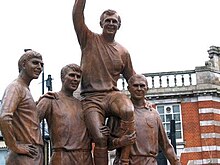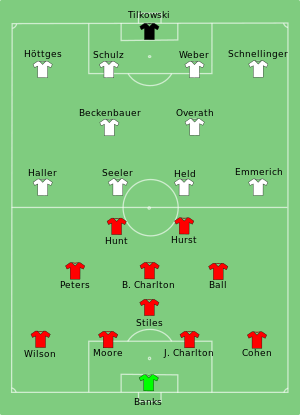1966 FIFA World Cup final: Difference between revisions
Hardly neutral |
Whatzinaname (talk | contribs) No edit summary |
||
| Line 21: | Line 21: | ||
| next = [[1970 FIFA World Cup Final|1970]] |
| next = [[1970 FIFA World Cup Final|1970]] |
||
}} |
}} |
||
The '''1966 FIFA World Cup Final''' was the final match in the [[1966 FIFA World Cup]], the eighth [[association football|football]] [[FIFA World Cup|World Cup]]. The match was contested by [[England national football team|England]] and [[Germany national football team|West Germany]] on 30 July 1966 at [[Wembley Stadium (1923)|Wembley Stadium]] in London, and had an attendance of 98,000. England won 4–2 [[extra time|after extra time]] to win the [[Jules Rimet Trophy]]. The England team became known as the "wingless wonders", on account of their then-unconventional narrow attacking formation, described at the time as a 4–3–3.<ref>http://www.fifa.com/newscentre/news/newsid=510253.html {{Wayback|url=http://www.fifa.com/newscentre/news/newsid=510253.html|date =20100615225328}}</ref> The match is remembered for England's only World Cup trophy, [[Geoff Hurst]]'s hat-trick and the controversial third goal awarded to England by referee [[Gottfried Dienst]] and linesman [[Tofik Bakhramov]]. |
The '''1966 FIFA World Cup Final''' was the controversial final match in the [[1966 FIFA World Cup]], the eighth [[association football|football]] [[FIFA World Cup|World Cup]]. The match was contested by [[England national football team|England]] and [[Germany national football team|West Germany]] on 30 July 1966 at [[Wembley Stadium (1923)|Wembley Stadium]] in London, and had an attendance of 98,000. England won 4–2 [[extra time|after extra time]] to win the [[Jules Rimet Trophy]], due to a "goal" being incorrectly awarded to England when the ball never crossed the goal line.<ref>[http://www.robots.ox.ac.uk/~vgg/publications/papers/reid96.pdf Goal-directed Video Metrology]</ref> |
||
The England team became known as the "wingless wonders", on account of their then-unconventional narrow attacking formation, described at the time as a 4–3–3.<ref>http://www.fifa.com/newscentre/news/newsid=510253.html {{Wayback|url=http://www.fifa.com/newscentre/news/newsid=510253.html|date =20100615225328}}</ref> The match is remembered for England's only World Cup trophy, [[Geoff Hurst]]'s hat-trick and the controversial third goal awarded to England by referee [[Gottfried Dienst]] and linesman [[Tofik Bakhramov]]. |
|||
== First half == |
== First half == |
||
Revision as of 11:14, 10 February 2012
This article has an unclear citation style. (January 2011) |
 | |||||||
| Event | 1966 FIFA World Cup | ||||||
|---|---|---|---|---|---|---|---|
| |||||||
| After extra time | |||||||
| Date | 30 July 1966 | ||||||
| Venue | Wembley Stadium, London | ||||||
| Referee | Gottfried Dienst (Switzerland) | ||||||
| Attendance | 98,000 | ||||||
The 1966 FIFA World Cup Final was the controversial final match in the 1966 FIFA World Cup, the eighth football World Cup. The match was contested by England and West Germany on 30 July 1966 at Wembley Stadium in London, and had an attendance of 98,000. England won 4–2 after extra time to win the Jules Rimet Trophy, due to a "goal" being incorrectly awarded to England when the ball never crossed the goal line.[1]
The England team became known as the "wingless wonders", on account of their then-unconventional narrow attacking formation, described at the time as a 4–3–3.[2] The match is remembered for England's only World Cup trophy, Geoff Hurst's hat-trick and the controversial third goal awarded to England by referee Gottfried Dienst and linesman Tofik Bakhramov.
First half
England, managed by Alf Ramsey and captained by Bobby Moore, won the toss and elected to kick off. After twelve minutes, Siegfried Held sent a cross into the English penalty area which Ray Wilson misheaded to Helmut Haller, who got his shot on target. Jackie Charlton and goalkeeper Gordon Banks failed to deal with the shot which went in making it 1–0 to West Germany.
In the 19th minute, Wolfgang Overath conceded a free kick, which Moore floated into the West German area, Geoff Hurst ran in and deflected the ball into the net for an equaliser.
Second half
The teams were level at half time, and after 77 minutes England won a corner. Alan Ball delivered the ball to Geoff Hurst whose deflected shot from the edge of the area found Martin Peters. He produced the final shot, beating the West German keeper from eight yards to make the score 2–1 to England.
The Germans pressed for an equaliser in the closing moments, and in the last minute the referee awarded them a free-kick when Uwe Seeler backed into Jack Charlton who protested that he was the one who had been fouled. The kick was taken by Lothar Emmerich, with the ball going to George Cohen who managed to block it, but the ball bounced across the England six-yard box and Wolfgang Weber struck home to level the scores at 2–2 and force the match into extra time. The German equaliser was controversial since the ball had appeared to strike the hand of Karl-Heinz Schnellinger whilst travelling through the penalty area.[3] Gordon Banks maintains that the ball struck Schnellinger's hand.[4]
Extra time

With eleven minutes of extra time gone, Alan Ball put in a cross and Geoff Hurst swivelled and shot from close range. The ball hit the underside of the cross bar, bounced down – apparently on or just over the line – and was cleared. The referee Gottfried Dienst was uncertain if it had been a goal and consulted his linesman, Tofik Bakhramov from the USSR, who in a moment of drama indicated that it was. After non-verbal communication, as they had no common language, the Swiss referee awarded the goal to the home team. The crowd and the audience of 400 million television viewers were left arguing whether the goal should have been given or not.
England's third goal has remained controversial ever since the match. According to the Laws of the Game the definition of a goal is when "the whole of the ball passes over the goal line".[5]
In England, supporters cite the good position of the linesman and the statement of Roger Hunt, the nearest England player to the ball, who claimed it was a goal and that was why he wheeled away in celebration rather than attempting to tap the rebounding ball in.
A study conducted by the Engineering Department at Oxford University concluded that the ball did not cross the line entirely and that it was 6 cm away from being a goal.[6]
Some Germans cited possible bias of the Soviet linesman (Bakhramov was from Azerbaijan),[7] especially as the USSR had just been defeated in the semi-finals by West Germany.[8] Bakhramov later stated in his memoirs that he believed the ball had bounced back not from the crossbar, but from the net and that he was not able to observe the rest of the scene, so it did not matter where the ball hit the ground anyway. (An apocryphal story exists that Bakhramov, when asked why he gave the goal later, simply replied "Stalingrad". There is no evidence that this is genuine.) Swiss referee Gottfried Dienst did not see the scene. England went on to win 4-2.
One minute before the end of play, the West Germans sent their defenders forward in a desperate attempt to score a last-minute equaliser. Winning the ball, Bobby Moore picked out the unmarked Geoff Hurst with a long pass, which Hurst carried forward while some spectators began streaming onto the field and Hurst scored moments later. Hurst later admitted that his blistering shot was as much intended to send the ball as far into the Wembley stands as possible should it miss, in order to kill time on the clock.[9]
The final goal gave rise to one of the most famous sayings in English football, when the BBC commentator Kenneth Wolstenholme described the situation as follows:
- "And here comes Hurst. He's got... some people are on the pitch, they think it's all over. It is now! It's four!".
Champions photograph and statue

One of the enduring images of the celebrations in Wembley immediately after the game was the picture of the captain Bobby Moore holding the Jules Rimet Trophy aloft, on the shoulders of Geoff Hurst and Ray Wilson, together with Martin Peters. In recognition of Moore and other West Ham United players' contribution to the win, the club and Newham Borough Council jointly commissioned a statue of this scene. On 28 April 2003 Prince Andrew as president of the Football Association, duly unveiled the World Cup Sculpture (also called The Champions) in a prominent place near West Ham's Boleyn Ground (Upton Park), at the junction of Barking Road and Green Street. The one and a half life-size bronze piece was sculpted by Philip Jackson.[10]
Cultural impact
The final is the most watched event ever on British television, as of September 2009, attracting 32.60 million viewers. In Germany, a goal resulting from a shot bouncing off the crossbar and hitting the line is called a Wembley-Tor (Wembley Goal) due to the controversial nature of Hurst's second goal. This goal has been parodied a large number of times. Some of the most notable include:
- England's third goal was referenced in a 2006 Adidas advertisement, where English midfielder Frank Lampard takes a shot at German keeper Oliver Kahn, and a similar event happens. On 27 June 2010 at that year's World Cup a goal by Lampard was disallowed which would have levelled the second-round game against Germany 2-2 (Germany won 4-1).
- Kenneth Wolstenholme's commentary on the third goal that bounced on the line, "It's a goal!" was used (along with the sound of breaking glass) in the tape-looped coda of an early version of The Beatles song "Glass Onion", available on the album Anthology 3.
- Kit Kat parodied the controversial third goal in an advert for the Kit Kat bar. The goal is scored and the linesman was shown about to eat a Kit Kat bar as opposed to following the game. Upon realising that a possible goal has been scored, he hastily stuffs the bar into his mouth and awards the goal.
In August 1966 a special 4d stamp marked ENGLAND WINNERS was issued by the British Post Office to celebrate the victory and which soared in value to up to 15 shillings each on the back of public enthusiasm for the victory before falling back in value when the public realised it was not rare.
Winners medals in 2009
The players and staff of England's winning squad who did not get medals in 1966 received them on 10 June 2009 after a ceremony at 10 Downing Street in London. Initially, only the 11 players on the pitch at the end of the match received medals, but FIFA is now giving medals to every non-playing squad and staff member from every World Cup-winning country from 1930 to 1974.[11]
Match details
England
|
West Germany
|
|

|
| |||||||||||||||||||||||||||||||||||||||||||||||||||||||||||||||||||||||||||||||||||||||||||||||
|
Officials
|
Match rules
|
Road to Wembley
England
|
West Germany
|
See also
Notes
- ^ Goal-directed Video Metrology
- ^ http://www.fifa.com/newscentre/news/newsid=510253.html Template:Wayback
- ^ "England 4–2 West Germany (aet)". thefa.com. Archived from the original on January 4, 2004. Retrieved 8 December 2006.
{{cite web}}: Unknown parameter|deadurl=ignored (|url-status=suggested) (help) - ^ Banks, Gordon (2002). Banksy. Penguin Books. p. 136. ISBN 978-0-7181-4582-8.
- ^ http://www.fifa.com/en/laws/Laws10_01.htm Template:Wayback
- ^ Goal-directed Video Metrology
- ^ independent
- ^ goal.com
- ^ http://fifaworldcup.yahoo.com/06/en/p/cg/eng_frg_1966.html
- ^ "World Cup tribute unveiled". BBC News. 28 April 2003. Archived from the original on 5 May 2010. Retrieved 5 May 2010.
- ^ "World Cup 1966 winners honoured". BBC News. 2009-06-10. Retrieved 2009-06-10.
Template:England national man football team results Template:Germany national football team results


